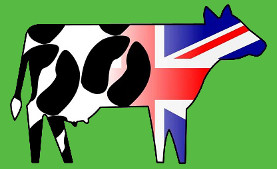By Bruderer, A. and Muggli, E. and Nuss, K. and Weidmann, E., Vet Comp Orthop Traumatol, 2015
Description
A two-year-old Braunvieh heifer was presented with a traumatic luxation of the second phalanx of the medial digit and concurrent subluxation of the second phalanx of the lateral digit of the right hindlimb. Closed reduction of both luxations was possible. Surgical arthrodesis was achieved using one narrow 4.5 mm three-hole equine locking compression plate for each joint. Placement of the bone plates resulted in stable arthrodesis of both proximal interphalangeal joints of the right hindlimb but there was persistent residual lameness. The heifer delivered a healthy calf but was slaughtered eight months after surgery because of varus deformity of the contralateral limb. Radiographs taken post-mortem revealed pronounced periosteal reactions involving both proximal interphalangeal joints and only partial bony bridging of the joint spaces.
A two-year-old Braunvieh heifer was presented with a traumatic luxation of the second phalanx of the medial digit and concurrent subluxation of the second phalanx of the lateral digit of the right hindlimb. Closed reduction of both luxations was possible. Surgical arthrodesis was achieved using one narrow 4.5 mm three-hole equine locking compression plate for each joint. Placement of the bone plates resulted in stable arthrodesis of both proximal interphalangeal joints of the right hindlimb but there was persistent residual lameness. The heifer delivered a healthy calf but was slaughtered eight months after surgery because of varus deformity of the contralateral limb. Radiographs taken post-mortem revealed pronounced periosteal reactions involving both proximal interphalangeal joints and only partial bony bridging of the joint spaces.
We welcome and encourage discussion of our linked research papers. Registered users can post their comments here. New users' comments are moderated, so please allow a while for them to be published.
